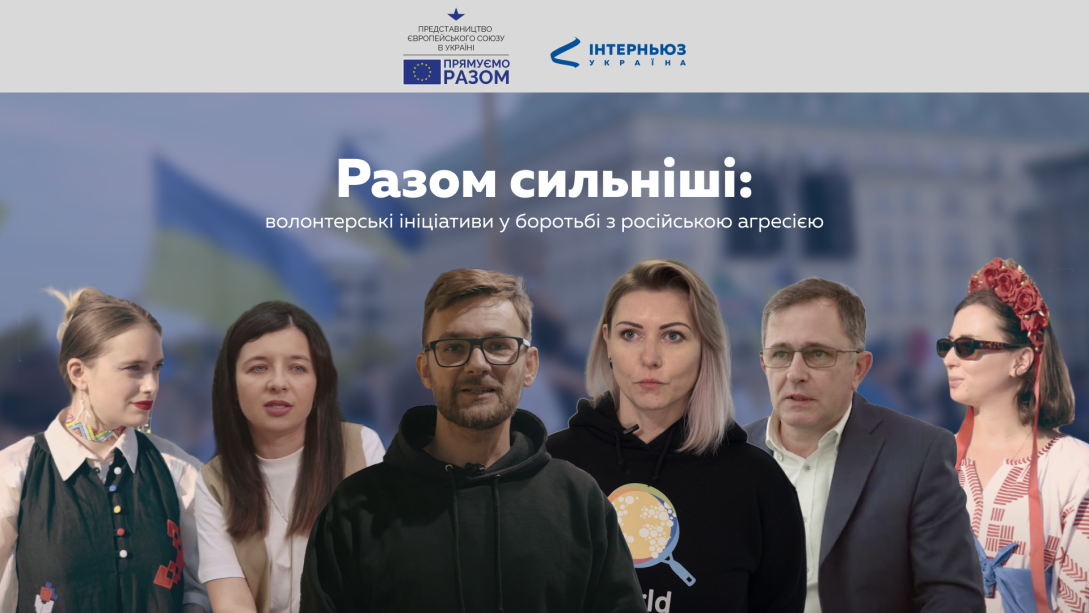Stronger together: volunteer initiatives in the fight against Russian aggression (Video digest)

The project spoke with representatives of 5 organizations that work throughout Europe and are contributing to Ukraine’s future victory, providing everything from advocacy and art projects to debris removal and food aid.
Organizations presented in the video digest: https://bit.ly/volunteer_initiatives
- Vitsche Berlin – an association of young Ukrainians in Germany which holds protests and cultural and educational events, helps refugees, and organizes humanitarian aid for Ukraine.
"It's very important for us not only to fight with narratives about the present, but also with historical ones, to reconstruct this politics of memory, to advocate the interests of Ukraine in all the areas in which we have experience in order to appeal to Germany," explain Eva Yakubovska, Vitsche Berlin’s co-founder.
- Euromaidan-Warszawa – a public initiative founded in 2013 with the goal of helping Ukraine’s accession to the European Union. Since February 24, 2022, the team has focused its work on bringing Ukraine's victory as soon as possible through advocacy, volunteering, and direct action protests. In addition to traditional advocacy campaigns, the organization often holds art performances.
"The first few months of the full-scale war were all a blur, and we hardly slept or ate. We sent the first humanitarian aid to Ukraine on the very first day. From February 24, we started to organize protests and advocacy, and to collect aid for the civilian population and the military in parallel," says Nataliya Panchenko, head of Euromaidan-Warszawa and the Stand With Ukraine Foundation.
- World Central Kitchen – a non-profit non-governmental organization that provides food to victims of catastrophes around the world. WCK was founded in 2010 by famous Spanish-American chef and restaurateur Jose Andres. In the first months of the full-scale invasion, the WCK team distributed millions of fresh meals to Ukrainian IDPs and refugees. They now support front-line communities in the east and south of Ukraine. WCK's assistance in Ukraine includes both hot, freshly prepared meals and large packages of food for families.
"In the first 2-3 days of the full-scale invasion, the [WCK’s] mission was already in Ukraine. In the spring and early summer of 2022, the mission reached such volumes that every month we brought 170 trucks with food to Ukraine. Donors included people from Poland, Spain, Italy and other EU countries," said Iryna Lytvynchuk, WCK's financial operations director.
- Brave to Rebuild – a volunteer initiative that rebuilds Ukrainian cities and towns. Every weekend and weekday, volunteers organize clean-ups, dismantling debris and repairing damaged residential and public buildings. In addition to clearing rubble and construction, the initiative collects and distributes humanitarian aid to help people rebuild their homes and survive the winter.
"People in the liberated territories wanted to return to a peaceful life as soon as possible. That is why this initiative was born, with the slogan ‘Brave to Rebuild," explains Vitaly Selyk, co-founder and head of the BRAVE Foundation.
- Spilka – the association of Ukrainian immigrants in Portugal. The organization was created in June 2003. During the ongoing war, the union has organized protest actions, collected funds, and provided humanitarian aid — both for civilians and the Ukrainian military.
"Since the beginning of the full-scale war, our union has received more than 30 resolutions by city and district councils that condemn Russian aggression and try to help us. We have become a center of information between Portugal and Ukraine," said Pavlo Sadoha, president of the Spilka Association of Ukrainians in Portugal.
The videos were created as part of the project “EU Regional information and cultural diplomacy activities 2022-2023”, financed by the EU Delegation to Ukraine.
